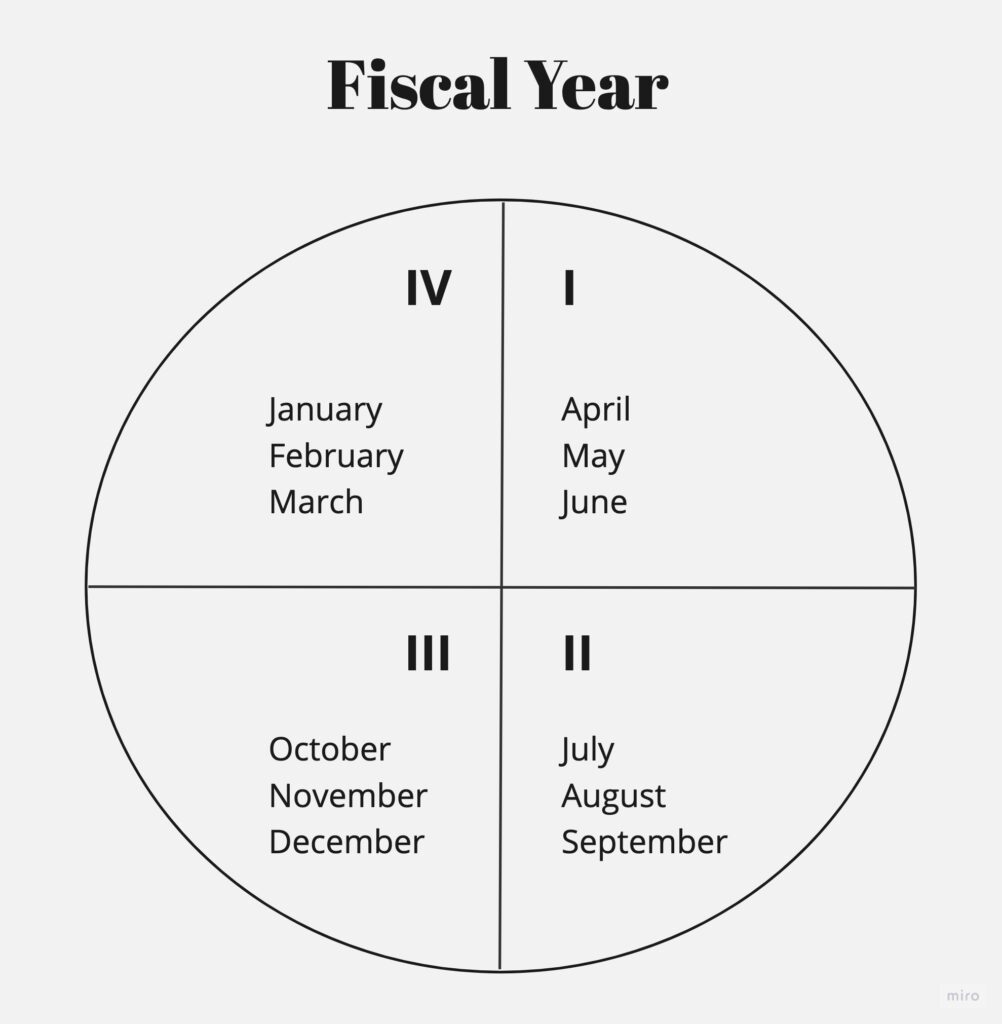A fiscal year is a 12-month period used by companies, government, and organisations to file their financial statements, earnings and more. A fiscal year is synonymous with a financial year, representing an entity’s income-generating period.
In India, the fiscal year starts on the 1st of April and ends on the 31st of March. Let’s understand more in detail about the fiscal year’s meaning, how it works and more.
You will Learn About:
What is a fiscal year?

A fiscal year is the accounting period used by companies to report their business metrics. The starting and ending of this 12-month period may vary across countries, entities, and business cycles. A fiscal year is divided into four quarters, where each quarter has a duration of 3 months. In India, companies report their financial results for each quarter. It will help investors to gauge on the financial performance of the company and take the decision, whether to stay invested or sell their shares.
You may wonder when does the financial year start? Let us take an example to understand what is the current financial year in India, the four quarters it comprises and the time frame around it.
The current financial year is 2023-24
- First quarter (Q1): 01st April 2023 to 30th June 2023
- Second quarter (Q2): 01st July 2023 to 30th September 2023
- Third quarter (Q3): 01st October 2023 to 30th December 2023
- Fourth quarter (Q4): 01st January 2024 to 31st March 2024
Return on equity: Highlights
- A fiscal year denotes the 12-month period of earnings, whereas an assessment year denotes the 12-month period during which income tax returns are filed.
- A fiscal year comprises four quarters. The duration of each quarter is three months.
- A fiscal year precedes the assessment year.
- The current fiscal year in India is from 1st April 2023 to 31st March 2024. The corresponding assessment year would start on 1st April 2024 and end on 31st March 2025.
- Following a fiscal year provides many benefits ranging from making income tax assessment easier to meet regulatory requirements.
Fiscal year vs assessment year in India
| Fiscal/financial year | Assessment year |
| It is a 12-month time period adopted by organisations to analyse and report their performance. | It denotes the 12-month time frame to file income tax returns. |
| The fiscal year and financial year effectively mean the same thing. One can use these terms interchangeably. | The assessment year follows the fiscal year. It follows the logic of ‘earnings before taxes.’ |
| The 12-month period can vary depending on the organisation and the country of incorporation. | An assessment year in India starts and ends on the same dates (apart from the year) as the fiscal year followed by organisations, i.e. 1st April to 31st March. |
| A fiscal year is not necessarily based on a calendar year. | Similarly, an assessment year is not necessarily based on a calendar year. |
What is the current financial year in India?
The current financial year (which is effectively the same as the current fiscal year) in India started on 1st April 2023 and will end on 31st March 2024. This is the 12-month time frame for which organisations (and individuals) will prepare financial statements reflecting their income through their business operations and other activities.
The corresponding assessment year for the current fiscal year will be from 1st April 2024 to 31st March 2025. This 12-month time frame will be used to file taxes for the current fiscal year.
Why does the financial year in India start from 1st April and not 1st Jan?
A question that is asked by many individuals is this – why financial year starts from April?
The reason for adopting this time range comes from the time when India was a colony. The British Empire had adopted the Gregorian calendar, according to which the new year would start on the 1st of April. The same was imposed on India during colonisation, and the country persisted with it.
India continues to follow this 12-month time frame as it also has a strong connection with the Hindu calendar that celebrates the new year in the month of March / April.
How does a fiscal year work?
Organisations use the fiscal year to analyse and report their performance.
They can choose any 12-month window depending on their operations and seasonality patterns. An organisation may also want to keep its fiscal year aligned with the assessment year for ease of reporting and filing income tax returns.
Benefits of fiscal year (Adoption)
- A fiscal year helps the management and investors of an organisation to analyse its performance year on year.
- It provides a specific timeline to monitor and review the revenues and expenses during that period. Analysts or business managers can easily compare this information to the future or past performance of the same organisation or competitors.
- The Securities and Exchanges Board of India mandates every organisation to publish its financial statements. Following a fiscal/financial year helps the organisation comply with SEBI’s requirements.
Conclusion
To report and analyse their earnings, organisations and individuals refer to different calendars and modes. These periods may depend on the country and many other factors. Individuals and companies need to understand the difference between assessment and fiscal years to properly account for their earnings and taxes.
FAQs
Did you Like the Explanation?
Authored By:
I am a finance enthusiast who loves exploring the world of money through my lens. I’ve been dedicated to building systems that work and curating content that helps people learn.
As an insatiable reader and learner, I’ve spent the last two years exploring the world of finance. With my creative mind and curious spirit, I love making complex finance topics easy and fun for everyone to understand. Join me on my journey as we navigate the world of finance together!



